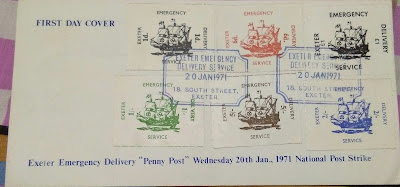These stamps were issued to celebrate the work of British agencies and organisations that save lives at sea.
SOS is the commonly used description for the International Morse code distress signal (· · · - - - · · ·). This distress signal was first adopted by the German government in 1905, and became the worldwide standard when it was included in the second International Radiotelegraphic Convention, and became effective on July 1, 1908.
To mark the centenary of the SOS signal the horizontal perforations have the SOS dot-dash pattern instead of normal uniform perforations.
Royal Mail marks this centenary with a set of 6 stamps highlighting the actions of the crews of Royal National Lifeboat Institution (RNLI) and the Maritime and Coast Guard Agency (MCA) who regularly risk their own lives attempting to save those of others.
Stamps :
1st - Barra Island, Outer Hebrides
46p - Appledore, Devon
48p - Portland, Dorset
54p - St Ives, Cornwall
69p - Selsey, West Sussex
78p - Tenby, Pembrokeshire
Recently acquired the above FDC ...
Inputs from : Norvic Philatelics


